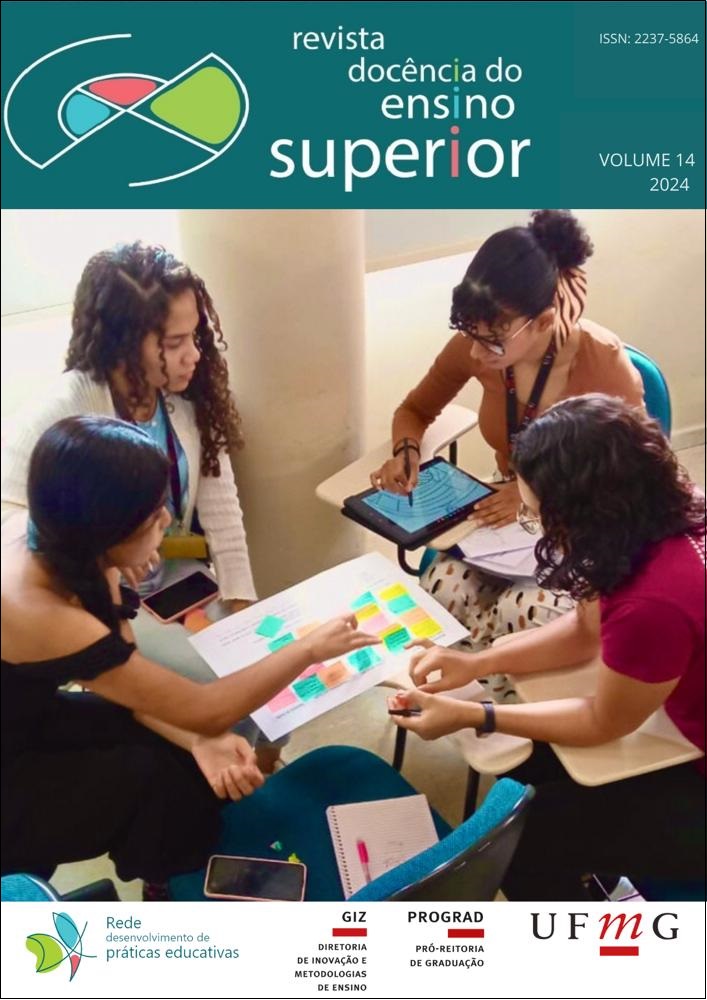Whirlwinds and hopefulness
curriculum and assessment in teacher education during times of emergency remote teaching
DOI:
https://doi.org/10.35699/2237-5864.2024.51810Keywords:
pandemic, remote teaching, curriculum, assessmentAbstract
This article analyzes the adaptations in the curriculum and assessment of the course Curriculum Theories offered to an undergraduate class in Pedagogy and a graduate class in Education at the Federal University of Minas Gerais during the first year of the coronavirus pandemic and its whirlwinds. The critical-reflexive analysis is based on a qualitative, exploratory, and descriptive study of the development of the course plan adapted for emergency remote teaching. The article revisits the institutional processes involved in authorizing the continuation of educational activities remotely, redefining pedagogical planning, describing and analyzing the methodological choices for course development and assessment. It is argued that amid the undeniable turbulent whirlwinds caused by the pandemic, it was possible to collectively develop a teacher education course whose curriculum and assessment needed to be rethought and adapted at the University. Thus, the collective commitment to life and public education led to the development of pedagogical strategies that mitigated the weaknesses of remote teaching. There were numerous gaps towards equity; however, the combination of efforts enabled the structuring of an assertively adapted course, fostering hope in teacher education.
Downloads
References
ANDRADE, Carlos Drummond de. Fala, amendoeira. Rio de Janeiro: J. Olympio, 1957.
BRASIL. Lei nº 13.005, de 25 de junho de 2014. Estabelece o Plano Nacional de Educação – PNE e dá outras providências. Diário Oficial da União: Seção 1, Brasília, DF, 26 jun. 2014. Disponível em: https://www.planalto.gov.br/ccivil_03/_ato2011-2014/2014/lei/l13005.htm. Acesso em: 06 set. 2024
CLAXTON, Charles S.; MURRELL, Patricia H. Learning styles. Washington, DC: George Washington University (ERIC), 1987.
COSTA, Fernando Albuquerque. O potencial transformador das TIC e a formação de professores e educadores. In: ALMEIDA, Maria Elizabeth Bianconcini; DIAS, Paulo; SILVA, Bento Duarte da (org). Cenários de inovação para a educação na sociedade digital. São Paulo: Edições Loyola, 2013.
LUCKESI, Cipriano. Avaliação da aprendizagem escolar: estudos e proposições. 14 ed. São Paulo: Cortez, 2002.
MINISTÉRIO DA EDUCAÇÃO. Portaria nº 343, 17 de março de 2020. Dispõe sobre a substituição das aulas presenciais por aulas em meios digitais enquanto durar a situação de pandemia do Novo Coronavírus - COVID-19. Diário Oficial da União, Brasília, 18 de mar. de 2020. Disponível em: https://www.in.gov.br/en/web/dou/-/portaria-n-343-de-17-de-marco-de-2020-248564376. Acesso em: 06 set. 2024.
MINISTÉRIO DA SAÚDE. Painel Coronavírus Brasil, 2020. Disponível em: https://covid.saude.gov.br. Acesso em: 06 set. 2024.
OMS declara o fim da emergência global de covid-19, Jornal Nacional, G1, 05 maio 2023. Disponível em: https://g1.globo.com/jornal-nacional/noticia/2023/05/05/oms-declara-o-fim-da-emergencia-global-de-covid.ghtml. Acesso em: 17 jul. 2024.
PARAÍSO, Marlucy. A ciranda do currículo com gênero, poder, resistência. Currículo sem Fronteiras, v. 16, n. 3, p. 388-415, set./dez. 2016. Disponível em: www.curriculosemfronteiras.org/vol16iss3articles/paraiso.pdf. Acesso em: 17 jul. 2024.
PEREIRA, Marcelo Almeida de Camargo; FELICETTI, Vera Lucia.; BARRO, Dânia; TREZZI, Clóvis; SPICER-ESCALANTE, Maria Luisa. Autoavaliação: observando e analisando a prática docente. Estudos em avaliação educacional. v. 31, p. 7-27, 2020. Disponível em: http://publicacoes.fcc.org.br/index.php/eae/article/view/7010/3972. Acesso em: 20 jan. 2024.
RODRIGUES, Ione Aparecida Neto. O mundo muda, a avaliação muda: reflexões sobre a avaliação da aprendizagem remota. In: RIBEIRO, Ana Elisa; VECCHIO, Pollyanna de Mattos Moura (org.). Tecnologias digitais e escola: reflexões no projeto aula aberta durante a pandemia. São Paulo: Parábola, p. 44-54, 2020. Disponível em: https://anadigital.pro.br/2020/10/30/tecnologias-digitais-e-escola. Acesso em: 09 de out. 2024.
SALES, Shirlei Rezende; EVANGELISTA, Gislene Rangel. Amor, coragem! Dilemas e possibilidades na relação com estudantes em tempos de pandemia. Revista Retratos da Escola, Brasília, v. 14, n. 30, p. 858-875, set./dez. 2020. DOI: https://doi.org/10.22420/rde.v14i30.1198. Disponível em: http://retratosdaescola.emnuvens.com.br/rde/article/view/1198. Acesso em: 25 jan. 2021.
SANT’ANNA, Denise. Lavar as mãos, descolonizar o futuro. São Paulo: Editora N-1, 2020. Disponível em: https://issuu.com/n-1publications/docs/pandemia_cr_tica_6. Acesso em: 6 set. 2024.
SARAIVA, Karla; TRAVERSINI, Clarice; LOCKMANN, Kamila. A educação em tempos de covid-19-19: o ensino remoto e a exaustão docente. Práxis Educativa. Ponta Grossa, v. 15, e2016289, p. 1-24, 2020. DOI: https://doi.org/10.5212/praxeduc.v.15.16289.094. Disponível em: https://www.revistas2.uepg.br/index.php/praxiseducatia. Acesso em: 06 set. 2024.
SILVA, Tomaz Tadeu. Documentos de Identidade. Belo Horizonte: Autêntica, 1999.
UNIVERSIDADE FEDERAL DE MINAS GERAIS. Resolução nº 02/2020, de 9 de julho de 2020. Regulamenta o ensino remoto emergencial para os cursos de graduação da UFMG durante período de pandemia da doença COVID-19. Conselho de Ensino, Pesquisa e Extensão, Minas Gerais, 16 jun. 2020. Disponível em: https://ufmg.br/storage/7/2/7/c/727cdac040b9f81d6c3a531b0e3cafe7_15944093123508_526377393.pdf. Acesso em: 06 set. 2024.
VON HUNTY, Rita. Esperança e imaginação política. Youtube, 2020. Disponível em: https://www.youtube.com/watch?v=iqI7ZHVniSg&list=PL71U4jKxR54IxlJoBK1ONBRi07NOCt94Z&index=5. Acesso em: 6 set. 2024.
Published
How to Cite
Issue
Section
License
Copyright (c) 2024 Shirlei Rezende Sales, Bruna de Oliveira Gonçalves

This work is licensed under a Creative Commons Attribution 4.0 International License.
Authors who publish in this journal retain the copyright and grant the journal the right of first publication, with the work simultaneously licensed under the Creative Commons Attribution License which allows the sharing of work with acknowledgment of authorship and initial publication in this journal.
Authors are authorized to take additional contracts separately, for non-exclusive distribution of the version of the work published in this journal (e.g. publish in institutional repository or as a book chapter), with acknowledgment of authorship and initial publication in this journal.
Open access policy:
Revista Docência do Ensino Superior is an Open Access journal, which means that all content is available free of charge, at no cost to the user or their institution. Users may read, download, copy, distribute, print, search, or link to the full texts of the articles, or use them for any other legal purpose, without seeking prior permission from the publisher or author, provided they respect the license to use the Creative Commons used by the journal. This definition of open access is in line with the Budapest Open Access Initiative (BOAI).
























